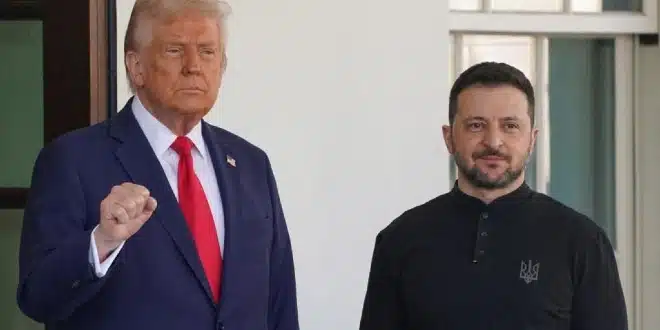The United States and Ukraine have formalized a minerals cooperation agreement, ending a two-month delay in negotiations. The deal, announced in Washington on Wednesday, marks a shift in U.S. engagement with Ukraine, as the administration of President Donald Trump reduces direct military assistance while emphasizing economic investment.
The agreement, which comes after extended talks, secures Ukraine’s control over its critical mineral resources. These resources, particularly rare earth elements essential for advanced technologies, remain largely undeveloped but are considered vital for future energy and manufacturing sectors.
Ukraine Secures Sovereignty and Economic Commitments
Ukrainian officials emphasized that the final version of the deal ensures full national sovereignty over subsoil assets, including natural resources and related infrastructure. Prime Minister Denys Shmygal stated that the agreement is balanced and serves the interests of both parties. He noted that Ukraine would not be expected to repay any past military support as part of the arrangement, resolving a major sticking point from earlier discussions.
A joint Reconstruction Investment Fund will be established under the deal, with the U.S. and Ukraine holding equal decision-making authority. Revenue generated through the fund will be reinvested solely within Ukraine, aimed at bolstering the country’s economic recovery and energy independence. Ukrainian Economy Minister Yulia Svyrydenko explained that financing would support projects across the minerals, oil, gas, and processing sectors.
Ukraine holds approximately five percent of global mineral and rare earth reserves. While many deposits remain untapped, some sites are located in areas currently under Russian control. Notably, Ukraine possesses substantial amounts of graphite, critical for electric battery production, along with sizable deposits of manganese, titanium, and lithium—the latter considered the largest known in Europe.
U.S. Shifts Approach Amid Ongoing Conflict
The Trump administration has framed the minerals deal as a new model of long-term engagement, emphasizing investment rather than traditional defense aid. Treasury Secretary Scott Bessent said the accord demonstrates sustained U.S. commitment to a stable, independent Ukraine. He also stressed that individuals or entities supporting the Russian war effort would not benefit from Ukraine’s reconstruction.
While Trump has been reluctant to offer binding security guarantees or endorse Ukraine’s NATO ambitions, he has promoted a continued U.S. presence linked to resource development. During a cabinet session, he argued that American involvement on the ground would deter potential threats to the areas targeted for mineral extraction.
Speaking at a televised town hall event, Trump revealed that he had encouraged Ukrainian President Volodymyr Zelensky to support the deal, suggesting it would strengthen Ukraine’s position in the face of a more powerful adversary. He later commented that the agreement might serve as a deterrent to Russian activity, though he stopped short of making specific commitments.
Political Tensions and Peace Negotiation Impasse
The minerals agreement arrives at a time of increased diplomatic friction between Washington and Kyiv. Earlier in the year, a contentious White House meeting saw Trump and Vice President JD Vance publicly criticize Zelensky for perceived lack of gratitude regarding U.S. aid. In response, Zelensky has taken steps to reaffirm support for ongoing American diplomatic initiatives.
Meanwhile, Secretary of State Marco Rubio has warned of abandoning mediation efforts unless both Russia and Ukraine present substantive proposals for a ceasefire. The Trump administration has floated the idea of Ukraine ceding some occupied territory to Russia in exchange for peace—a position rejected by both Kyiv and Moscow.
Zelensky continues to maintain Ukraine’s refusal to recognize Russia’s annexation of Crimea or agree to territorial concessions. The peninsula, seized by Russian forces in 2014, remains a core issue in ongoing peace negotiations. Despite the political sensitivities, Zelensky has expressed cautious support for the economic components of Trump’s policy, citing the need to secure long-term national recovery.
Criticism of the agreement has emerged from within the U.S. political system. Congressman Gregory Meeks, ranking Democrat on the House Foreign Affairs Committee, described the arrangement as coercive. He called on Trump to redirect attention toward applying pressure on the Kremlin rather than leveraging Ukraine’s economic vulnerabilities.
As reconstruction and economic recovery take precedence in Ukraine’s strategic outlook, the minerals agreement signifies a new chapter in its partnership with the United States. However, with key resource zones still under occupation and peace talks stalled, long-term success remains contingent on broader regional developments.


